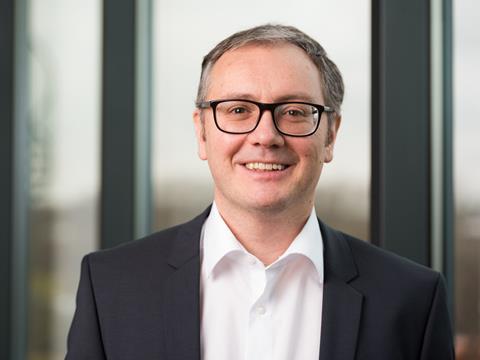
In this installment of our ‘In Conversation With…’ feature, Heiko Mack, Director of Kuraray’s Poval Business, discusses how Kuraray approaches key sustainability questions: carbon emissions reduction, the role of coatings, and the paper vs plastic debate.
On a company-wide level, how does sustainability manifest itself at Kuraray?
We started the journey some years back and are still on a fact-finding mission. We are investigating the starting points, tasks and future goals. Those are public knowledge, still we aim to achieve our goals by acculturating all possible measures.
We decided to install Portfolio Sustainability Assessments (PSA) and carry out screening to enhance objectivity and transparency when we set our targets of the products which contribute to both Natural and Living Environment. Sustainability is an essential part of all future investments, and we have invested in energy efficiency and other areas.
To be specific, our recently published LCA data for Kuraray Poval™ Polyvinyl alcohol (PVOH), for example, proves the high efficiency of our manufacturing units. This development will continue, and our mid-term plan foresees substantial investments to achieve the goals globally.
The reduction of carbon emissions is something that our industry is intently focused on right now. What are your thoughts on how LCAs can facilitate this, and how does Kuraray make use of them?
We recently calculated and published for the first time LCA data for our European sites. This is a good internal and external benchmark and in fact the starting point, as the data shows the status quo and leads to evidence-based measures for future requirements and potential investments.
We intend to calculate the LCA values for all our six Polyvinyl alcohol manufacturing units. The packaging industry now has transparent data on hand and the market can choose the right options for the future. Kuraray offers various solutions for today’s challenges, here our Exceval™ product range plays a major role.
I’d like to learn more about Kuraray’s EXCEVAL innovation. What is it, how does it work, and what kind of applications is it suitable for?
Plastic packaging is a big generator of waste and only a small part of this waste is recycled. Increasing consumer awareness regarding plastic pollution on land and sea has pushed more and more governments to put bans on plastic.
Besides plastics, the use of fluorinated polymers in food packaging is also under discussion. Brand owners are following this closely and they are looking to reduce plastic packaging and replace fluorinated polymers with more sustainable packaging options.
This calls for smart, innovative and sustainable packaging solutions:a big opportunity for paper and board coated with Kuraray’s fluorine-free, inherently biodegradable (when dissolved in water) and repulpable barrier polymer Exceval™.
Exceval™ is modified polyvinyl alcohol. It is a nonionic water-soluble polymer which makes it well-suited for water-based barrier coatings. Exceval™ is a linear and crystalline polymer.
The hydrophilic nature of polyvinyl alcohol makes it an excellent barrier against grease and oil, as well as mineral oils. The hydrogen bonds between the polymer chains, together with the crystalline structure, make Exceval™ one of the best barrier polymers, against oxygen and other gases such as carbon dioxide, on the market.
The modification of Exceval™ makes it more moisture resistant and a better film former compared to conventional polyvinyl alcohol. Exceval™ may be used as food contact material as it complies with BfR, FDA (FCN1179) and China GB.
As a company that is involved in the creation of both paper and plastic packaging, what are your thoughts on the paper vs plastic debate?
Paper packaging is becoming increasingly popular and consumers regard paper packaging as more sustainable. By using paper packaging, brand owners can show that they take quality and sustainability seriously. However, 100% paper packaging is not generally suitable for food. A suitable barrier layer is needed to resist moisture, oxygen and grease and seal in aroma.
That’s where Kuraray’s innovative solutions come in. Our products help you design customized paper packaging which meets all functional requirements – including for food. In addition, our experts will help you develop paper packaging concepts based on our barrier materials that meet repulpability requirements.
Plastic packaging deserves special attention in the quest to improve the sustainability of packaging. Reducing the amount of material, using plastics made from renewable resources and designing recyclable packaging is important to enhance the sustainability of plastic packaging. Products from Kuraray open up a wide range of possibilities.
We offer materials with a variety of benefits: bio-based, recyclable, water-soluble, fully biodegradable or compostable (industrial or home composting). In many cases, our products can be used for very thin barrier layers. These can greatly reduce the amount of material used in your packaging and even ensure that packaging can be recycled as a monomaterial.
As you can see: plastic packaging has enormous innovative potential. Our products and expertise can help you utilize that potential.
Packaging sustainability obviously requires collaboration across the entire value chain. When working with major brand owners, what are the most important things to consider?
We see a strong sustainability pull from brand owners and end consumers. Our R&D Centers and Technical Service teams are collaborative and listen to market needs. As a technology leader with, inter alia, a deep expertise in the Polyvinyl alcohol space, we are keen to co-develop solutions that meet market requirements and fulfil existing and future needs. For us, this technical dialogue is essential to ensure that we are providing the right materials at the right time to the market.
Close cooperation with involved companies is also required in order to be successful in developing novel new packaging solutions.













No comments yet